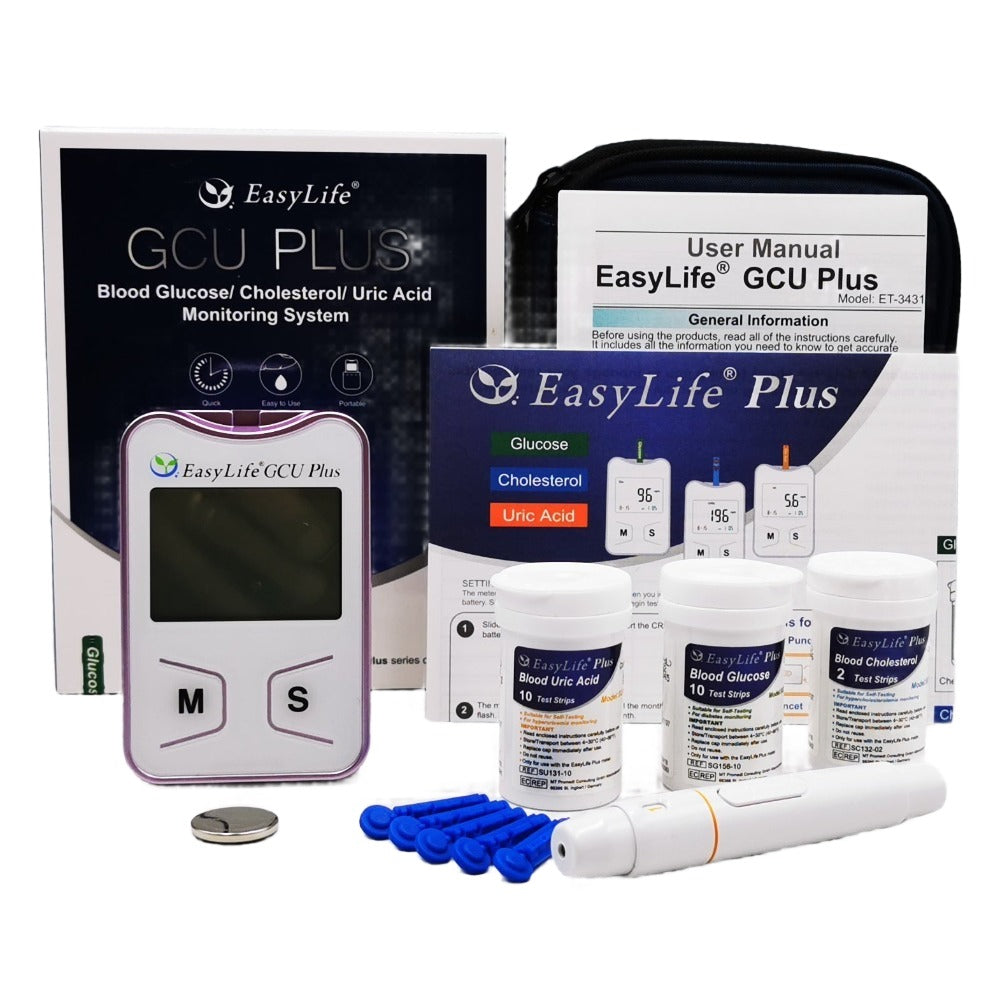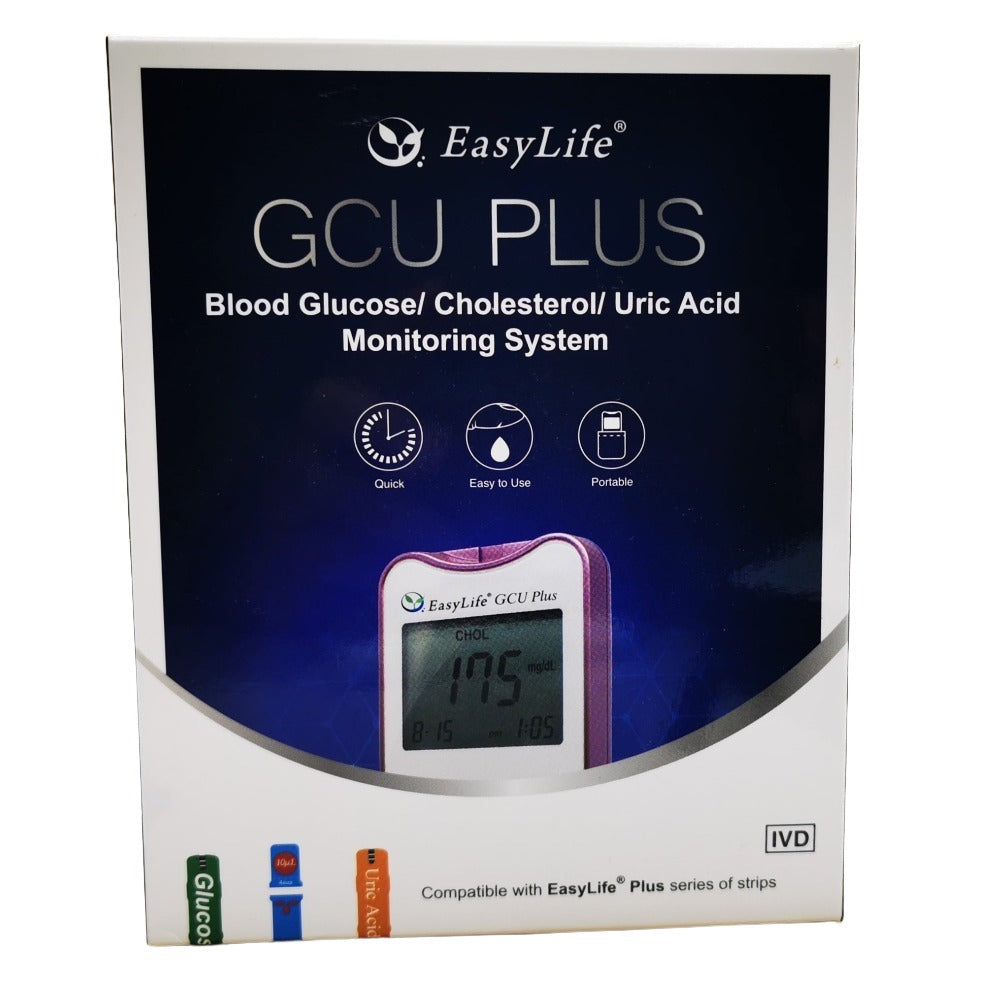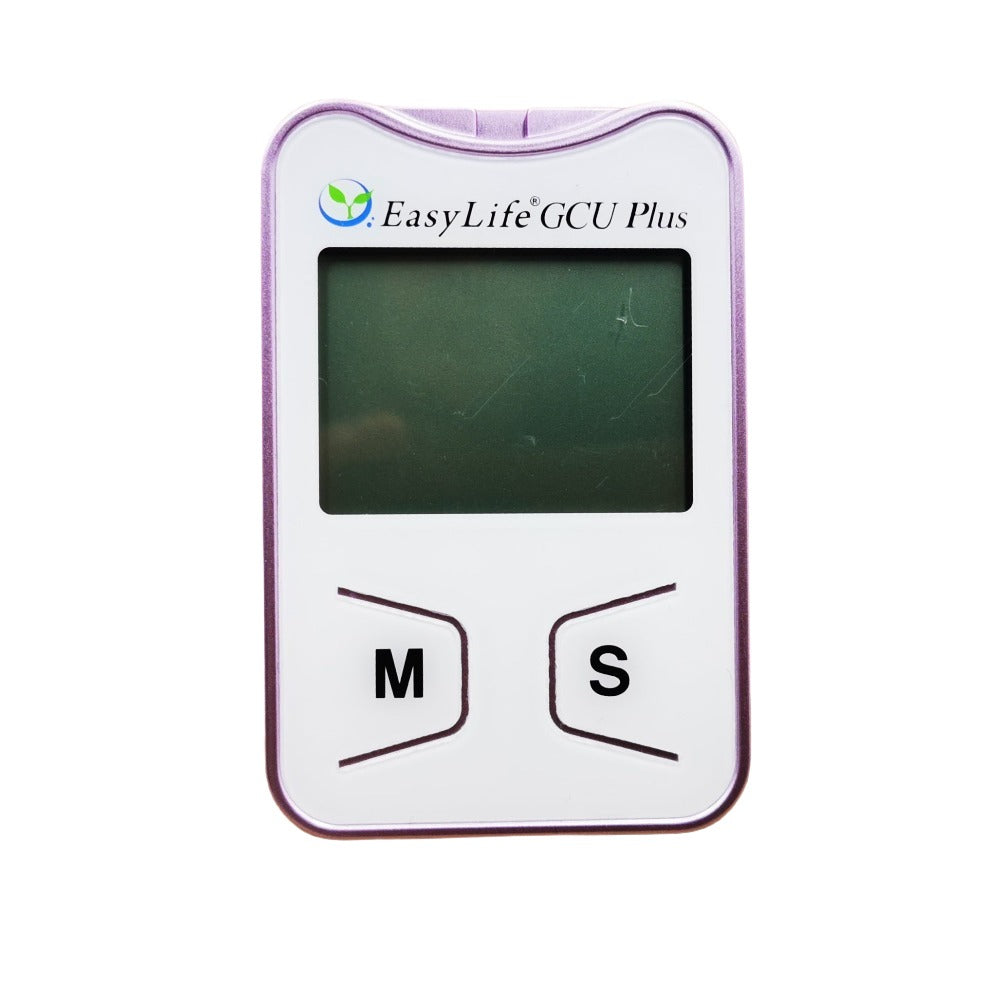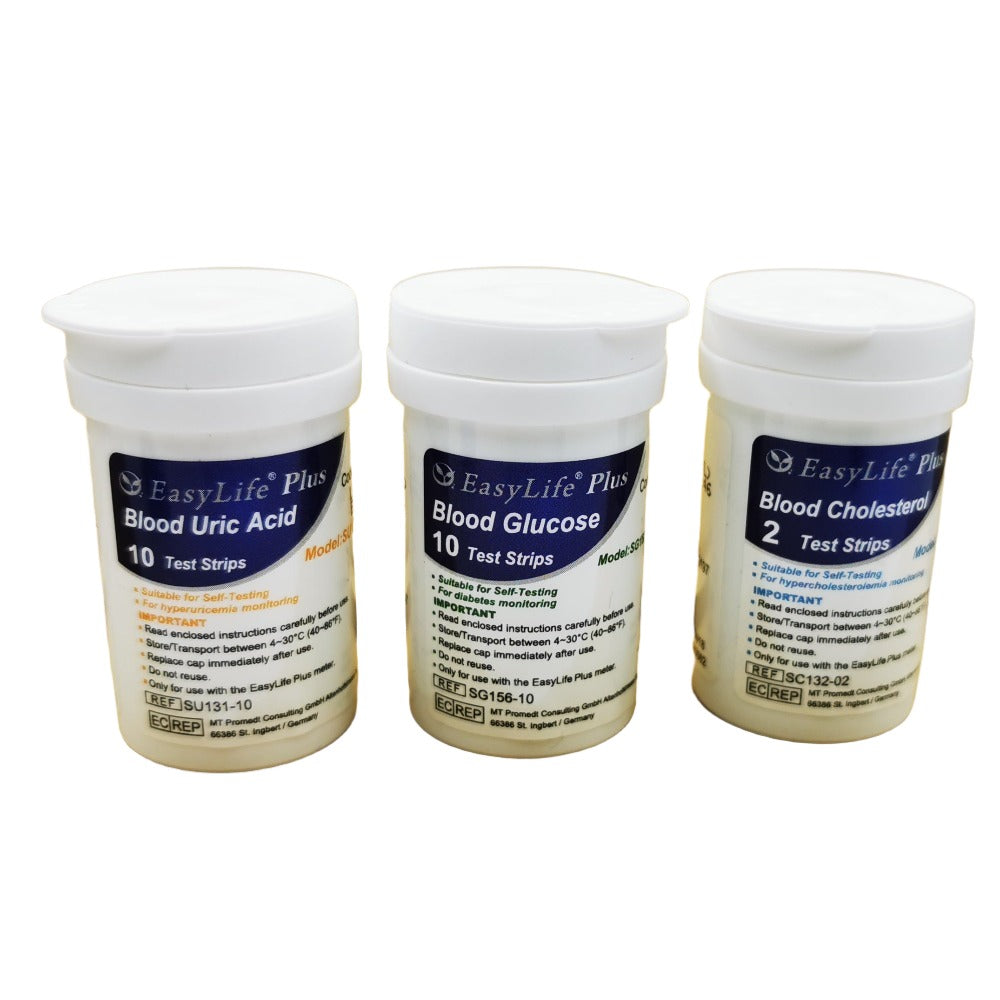Valuemed
EASYLIFE GCU PLUS Blood Glucose / Total Cholesterol / Uric Acid Meter
EASYLIFE GCU PLUS Blood Glucose / Total Cholesterol / Uric Acid Meter
Couldn't load pickup availability
3 in 1 cholesterol meter with test functions for finger prick blood testing, glucose and uric acid in addition to total cholesterol. Uric Acid is elevated in Gout
The EasyLife GCU Plus is the latest 3-in-1 monitoring kit, designed to measure glucose, cholesterol, and uric acid all in one convenient device.
The EasyLife GCU Plus Kit measures total cholesterol levels in the blood, helping to monitor overall health and monitor the effects of dietary changes. If total cholesterol is elevated, it is recommended that customers undergo a full lipid profile assessment.
While the device delivers highly accurate readings, results may differ by up to 15% compared to laboratory tests. This variance is largely due to the type of blood sample used laboratories typically analyze venous blood, whereas the Easylife meter uses capillary blood from a fingertip.
Key features of the Easylife GCU Plus meter
- Complete starter pack
- Fast easy reliable.
- Individual test strips for each test type
- Low-cost replacement test strips.
- 50-200 test memory.
- Switchable display scales (mmol/l -g/dl etc)
- CE certified for European clinical and self-test and professional use.
Contents included:
- Digital Meter
- Battery
- Instructions
- 10 Glucose test strips
- 2 Cholesterol test strips
- 10 Uric Acid test strips
- Lancets & lancing device.
The Easylife GCU starter pack includes colour-coded test strips, enabling patients and healthcare professionals to easily monitor blood glucose, cholesterol, and uric acid levels wherever they are. Simply insert the appropriate strip, apply a small blood sample (obtained using a lancet by fingerprick), and receive your results in moments.
- Glucose Strips: Green
- Cholesterol Strips: Blue
- Uric Acid Strips: Orange
Watch Easylife GCU meter demo, setup and test procedure video
Share
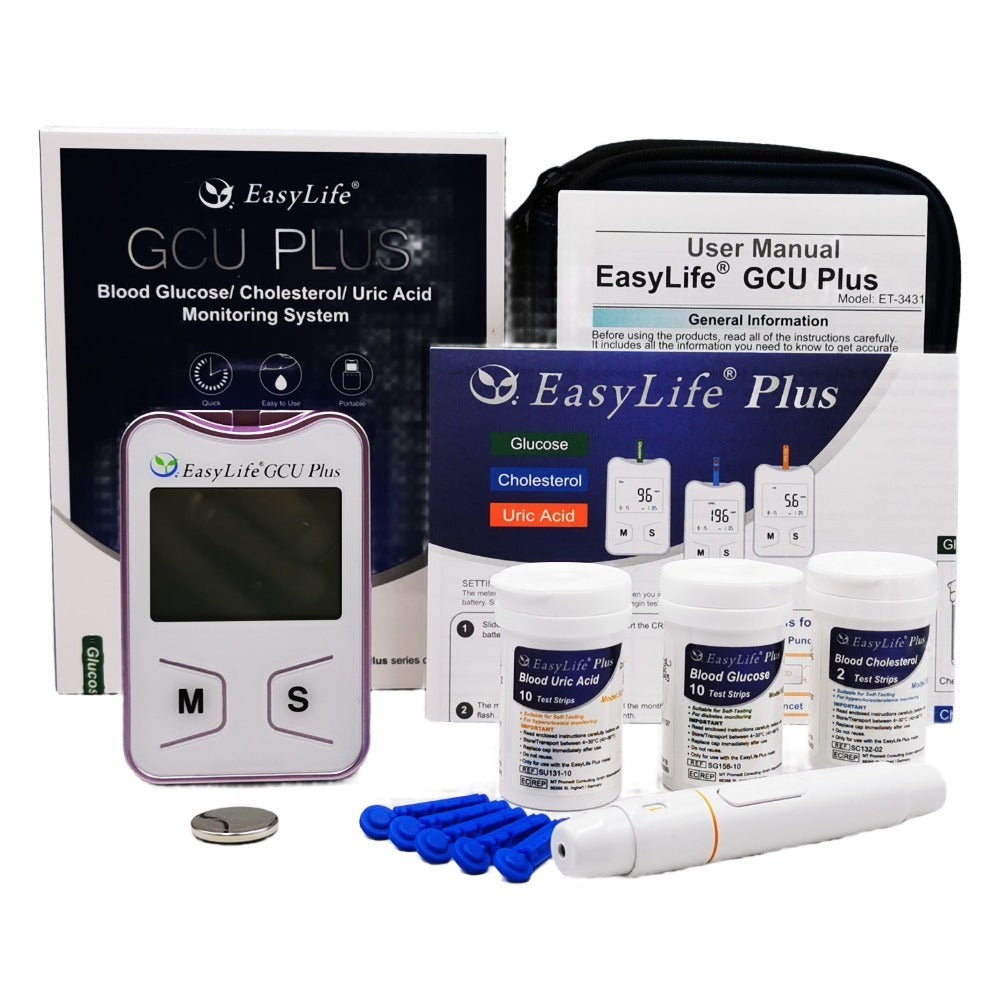
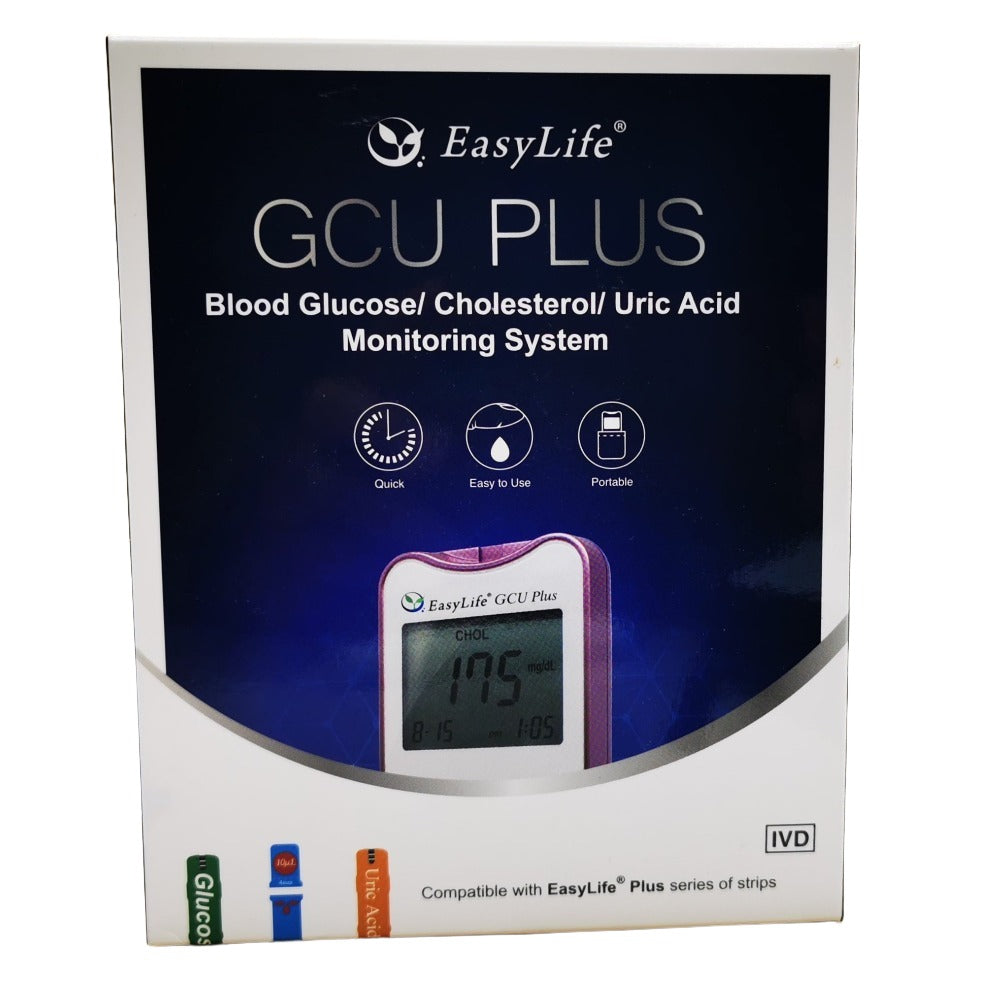
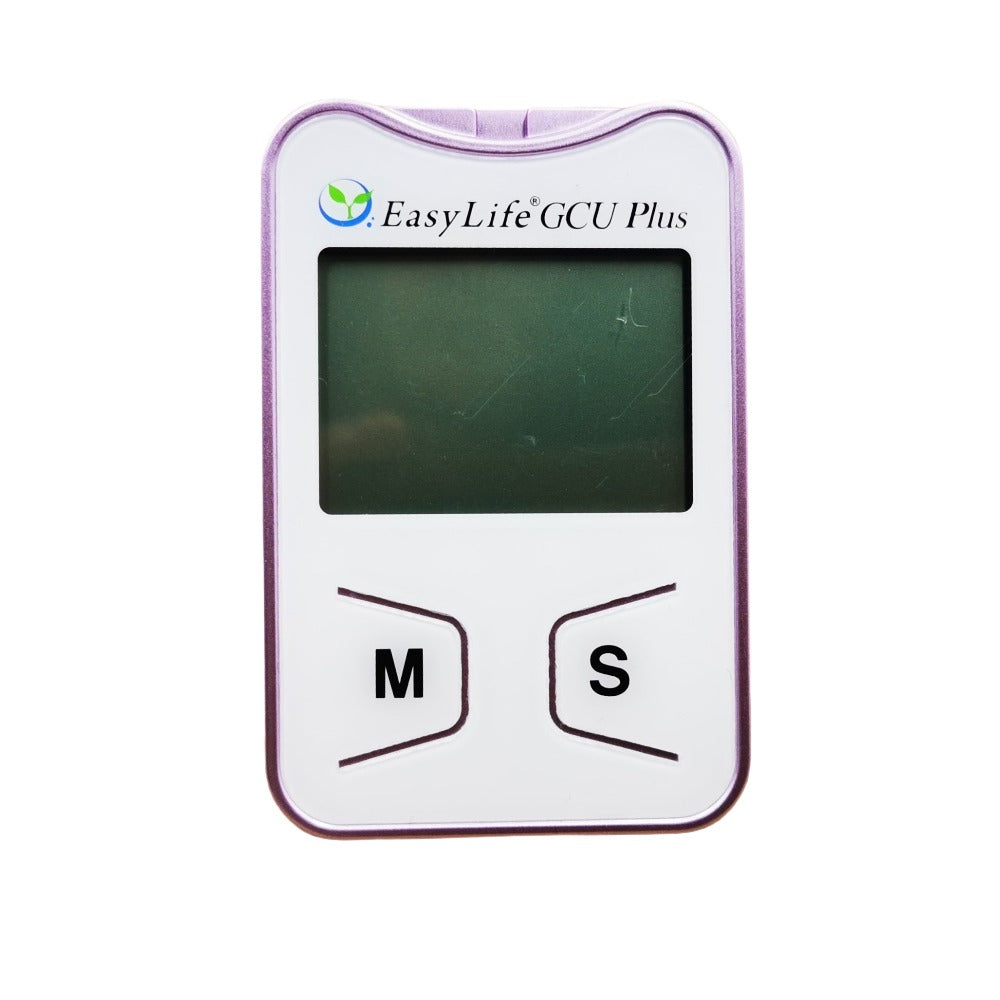
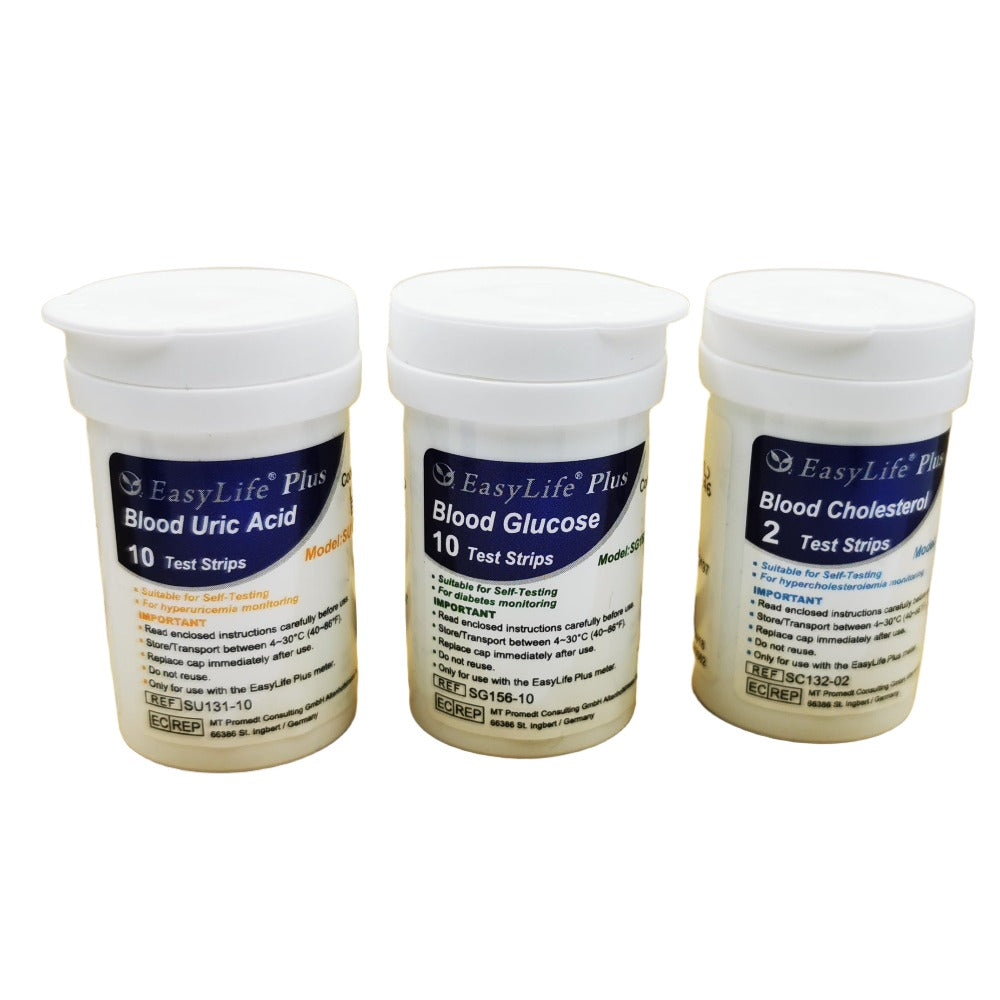
Collapsible content
When is the best time of day for a uric acid test?
For the most accurate and consistent readings of your blood uric acid levels, testing in the morning after an overnight fast is generally recommended. This approach minimizes the influence of dietary and physiological variations throughout the day.
What are lancets and how do you to use them?
A lancet is a small, sharp needle primarily used to prick the skin and draw blood, playing a crucial role in diabetes management by facilitating blood glucose monitoring.
Beyond diabetes care, lancets are also utilised for other medical purposes, such as collecting blood samples for various tests including home cholesterol tests, haemoglobin tests, uric acid tests and PSA tests. These devices are designed for single use.
Are there any medical conditions which would prevent me getting accurate cholesterol results?
Yes there are a few medical conditions and drug supplements that can interfere with your cholesterol test results.
Please consider the following if you are not getting consistent or accurate readings with your cholesterol meter:
- High dose Vitamin C. Ascorbic Acid supplements, often as part of multivitamins or taken on their own will interfere with results. If they are not prescribed and it is possible to stop taking Vitamin C in high dose, cholesterol testing can be resumed after 7 days.
- High Bilirubin levels in the blood will interfere with cholesterol test results. The level may be below that required to cause clinical jaundice. Raised bilirubin levels in the blood can occur in many medical conditions including anaemia, cirrhosis, following a blood transfusion, Gilbert syndrome—a common, inherited condition in which there is a deficiency of an enzyme that helps break down bilirubin, viral hepatitis, gall bladder disease, as a reaction to drugs (including statins) and in alcoholic liver disease.
- High urate levels can result from renal disease and early kidney failure but can also be caused by many other things including dehydration, diuretics (water retention relievers), drinking too much alcohol, drinking too much soda or eating too much of foods that contain fructose, a type of sugar, high blood pressure (hypertension), Immune-suppressing drugs, Leukemia.
- Haemolysis, the breakdown of large numbers of blood cells. Routinely follows a blood transfusion, but can also occur after trauma, surgery, and in a range of blood and bone marrow diseases.
With the exception of Vitamin C and prescribed drugs, most of the above will require medical investigation to confirm the underlying cause, but is worth considering if the cholesterol meter check device test is normal and the lancing technique, sample collection, and procedure are all correct. Please just don't blame the meter, or ignore the results, the problem may in fact be you! It could be something that you are taking or that you have an underlying medical condition that you may be completely unaware of!
Can you give me any tips on obtaining the finger prick blood sample?
Obtaining a good finger prick blood sample is crucial to getting accurate results with any home blood test. We have created a video for each product which shows a great demonstration of exactly how you should be using the lancets and test provided, and the prep needed to perfuse the fingers.
We have put together our top tips on performing a finger prick blood test to help you here
How to interpret your cholesterol test results
Cholesterol Test Results
Some of the Cholesterol meters just displaty total cholesterol and some display 5 results for each completed blood test. Results are displayed in one of 2 scale options you can select, mmol/L or mg/dL. In the UK most cholesterol level results will be given in mmol/L.
Total Cholesterol
A normal Total Cholesterol level is below 5.0 mmol/L (200mg/dL) Above 5.0 but below 6.18 mmol/L is considered borderline elevated. Above 6.20mmol/L is considered high.
A high total cholesterol level can increase your risk of cardiovascular disease. However, decisions about when to treat high cholesterol are usually based upon the level of LDL or HDL cholesterol rather than the level of total cholesterol.
Total cholesterol levels can be tested at any time of day but the LDL and Triglyceride levels can vary depending on what has been recently eaten. For this reason, fasting (9-12hr) total cholesterol measurement is preferred by most doctors where either of the above two is elevated.
HDL
HDL or High-Density Lipoprotein is a good element and levels of over 1.55mmol/L (60mg/dL) are excellent. Levels between 1.00 mmol/L and 1.55 mmol/L are normal. Below 1.0 mmol/L are unhealthy. Men tend to have lower HDL levels than women 1 versus 1.2 mmol/L an ideal to aim for is 1.4 mmol/L
LDL
LDL or Low-Density Lipoprotein Cholesterol often referred to as bad cholesterol increases cardiovascular disease risk and Levels should be kept below 3.0 mmol/L
Triglycerides
High triglyceride levels are also associated with an increased risk of cardiovascular disease.
Triglyceride levels are assessed as follows:
●Normal – Less than 1.7 mmol/L (150 mg/dL)
●Mildly increased – 1.7 to 5.6 mmol/L (150 to 499 mg/dL)
●Moderately increased – 5.6 to 10 mmol/L (500 to 886 mg/dL)
●Very high – Greater than 10 mmol/L (886 mg/dL)
If your Cholesterol levels are abnormal we can not give personal or medical advice, so please discuss the findings with your Doctor, Nurse, or Pharmacist.
What are normal Uric Acid Levels?
Here are the normal blood ranges for Uric Acid.
Adult Males between 200 – 430 umol/L
Adult Females between 140 – 360 umol/L
Uric acid (urate) is produced during the breakdown of purines and excreted in both urine and faeces. Not everyone with elevated uric acid gets gout, only if crystals form in synovial joints.
Reasons to measure uric Acid
Uric acid can be elevated in pregnancy (uric acid may be measured while investigation/monitoring pre-eclampsia) during chemotherapy and radiotherapy. Uric Acid is also monitored in cases of renal failure and Liver disease resulting from excessive use of alcohol, starvation. Other rarer causes of high uric acid include a high-protein diet and strenuous exercise. Elevated levels are also seen in the rare inherited disorder, Lesch-Nyhan syndrome.
Low uric acid levels also occur in severe liver disease, low protein diet, heavy metal poisoning, Wilson's disease, and some cancers.
Some drugs will affect uric acid levels. These include, raised levels caused by thiazide diuretics, theophylline and low-dose aspirin;
Low blood Uric Acid levels can occur with high-dose aspirin, corticosteroids, and allopurinol.
Can you use a lancet without an auto lancing device?
A lancet can be used alone or with a lancing device. Many people find it easier to obtain a finger prick blood sample if they use the lancet in a lancing device.
Most of our meters are supplied with starter packs of lancets and some with safety lancets. We suggest you continue to use the same lancets recommended by the manufacturer if possible. If you are struggling to get adequate samples move to a thicker lance, ie 21g is thicker than 28g or 30g (the thinnest)
Are home cholesterol tests accurate?
While home cholesterol test kits can provide reasonably accurate results, they may not be as precise as laboratory tests. Factors such as user error, sample collection, and test kit quality can influence accuracy.
Why should I use a cholesterol test kit?
Cholesterol test kits offer convenience, allowing you to check your cholesterol levels at home without visiting your doctor or a healthcare facility. Regular monitoring is essential for individuals with a history of high cholesterol or those on cholesterol-lowering medications.
It's often recommended for regular monitoring of cholesterol levels, especially if you have a family history of heart disease or if you're managing your cholesterol through lifestyle changes or medications.
How do cholesterol test kits work?
A cholesterol test kit is a home diagnostic tool designed to measure the levels of cholesterol in your blood. It typically includes test strips, a lancet for blood collection, and a device (cholesterol meter) to analyse the blood sample.
These home cholesterol kits usually use a small blood sample, often obtained through a fingerstick. The blood is applied to a test strip, which. is then inserted into the meter which analyses the sample to provide blood cholesterol level readings.
What is a cholesterol test kit?
A cholesterol test kit is a home diagnostic tool designed to measure the levels of cholesterol in your blood. It typically includes test strips, a lancet for blood collection, and a device (cholesterol meter) to analyse the blood sample.
How do I know if the cholesterol meter is accurate ?
While learning to use the cholesterol meter it is not uncommon for results to vary considerably between tests.
Here is a list of tips on getting consistently accurate results from your cholesterol meter:
1) Always lance the side of the finger, never the flat surface or pulp. The side of the finger is far more vascular and bleeds profusely. Wipe the first drop away and allow a large second drop to form naturally, without squeezing the finger. This technique is critical in getting accurate results. A bad lance technique is the main cause of wildly fluctuating results.
2) Dont expect the total cholesterol levels to be the same each time. Cholesterol levels have a diurnal variation and are naturally dynamic, see 3.
3) If your Triglyceride level is above 1.7mmol/L then you should move to testing while fasting as the Triglyceride levels will vary with meals and significantly affect the other readings on your meter.
4) You can check the meter function using one of the Test Devices supplied with the original meter starter pack. We have embedded a video demonstration of a device test in the product listing above.
5) Exclude medical and medication causes for the unexplained results, see below..
Should I do a fasting or non-fasting cholesterol test?
If your Total Cholesterol levels are in the normal range there is usually no need to test after fasting.
However, if your results indicate an elevated total cholesterol or high level of Triglycerides, over 1.7 mmol/L, then it is best to move to cholesterol testing after fasting for between 9 and 12 hours. This can easily be achieved by not eating after 7 pm and testing first thing the following morning.
Why is my uric acid high but I have no gout symptoms?
Elevated uric acid levels without the presence of gout symptoms is a situation known as hyperuricemia. Hyperuricemia occurs when there is an excess of uric acid in the blood. While gout is one of the conditions associated with high uric acid levels, not everyone with elevated uric acid will develop gout.
It's important to note that even without gout symptoms, persistently high uric acid levels may have implications for long-term joint health and could potentially contribute to other health issues. Regular monitoring and consultation with a healthcare professional are recommended, especially if you have risk factors for gout or other related conditions.
Does high uric acid levels run in families?
Yes, there is a genetic component to high uric acid levels, and the risk of hyperuricemia (elevated uric acid in the blood) and gout tends to run in families. If one or more close relatives, such as parents or siblings, have a history of gout or elevated uric acid, your risk of experiencing similar issues may be higher.
Genetics can influence how the body processes and eliminates uric acid. Variations in genes related to purine metabolism and uric acid excretion by the kidneys can contribute to the development of hyperuricemia. However, it's important to note that genetics is just one factor, and environmental factors, diet, lifestyle choices, and overall health also play crucial roles.
If there is a family history of gout or hyperuricemia, it may be wise to be proactive in managing lifestyle factors that can influence uric acid levels. This includes maintaining a healthy weight, staying hydrated, avoiding excessive alcohol consumption, and making dietary choices that minimise the intake of purine-rich foods.
Are uric acid home tests accurate?
This home uric acid test meter and strips is 97% accurate when compared to a laboratory uric acid. The meter tests a small blood sample obtained from a finger prick, to measure uric acid levels, whereas a laboratory test performed by your doctor will usually be done on a larger blood sample, obtained by venepuncture. The lab uric acid tests will usually be more comprehensive as the test is performed on a much larger blood sample, so it is still worth having your levels checked with your doctor from time to time.
Can I check my uric acid level at home?
It's now possible to check your uric acid levels at home using commercially available uric acid test kits and a meter. It's important to note that these uric acid tests may not be as comprehensive as those conducted in a clinical laboratory, but they are a very useful tool to monitor your uric acid levels.
How do you lower uric acid levels naturally?
Lowering uric acid levels naturally involves making lifestyle and dietary changes. Here are some tips that may help reduce uric acid levels:
- Hydration: Drink plenty of water to help flush out uric acid from the body. Aim for at least 8 glasses (64 ounces) of water per day, and more if you are physically active or live in a hot climate.
- Limit purine-rich foods: Reduce intake of foods high in purines, such as organ meats, seafood (especially anchovies and sardines), red meat, and certain vegetables (like asparagus and spinach). Instead, focus on a well-balanced diet that includes a variety of fruits, vegetables, whole grains, and lean proteins.
- Cherries: Some studies suggest that cherries and cherry juice may help lower uric acid levels. Consider incorporating fresh cherries or unsweetened cherry juice into your diet.
- Berries: Include berries like strawberries, blueberries, and blackberries in your diet. They are rich in antioxidants and may have anti-inflammatory effects.
- Low-fat dairy: Consuming low-fat dairy products, such as milk, yogurt, and cheese, may help lower uric acid levels. The proteins in dairy may have a protective effect against gout.
- Vitamin C: Foods rich in vitamin C, such as citrus fruits, bell peppers, and strawberries, may help lower uric acid levels. Consider incorporating these foods into your diet or taking a vitamin C supplement after consulting with a healthcare professional.
- Coffee: Some studies suggest that moderate coffee consumption may be associated with a lower risk of gout. However, individual responses can vary, and excessive caffeine intake should be avoided.
- Maintain a healthy weight: Losing excess weight can help lower uric acid levels. However, avoid crash diets, as rapid weight loss can temporarily increase uric acid levels.
- Limit alcohol: Alcohol, especially beer, has been linked to higher uric acid levels. Limit alcohol consumption or avoid it altogether, particularly if you have gout.
- Regular exercise: Engage in regular physical activity to help maintain a healthy weight and improve overall well-being. However, avoid intense exercise during gout flares.
Are there any foods that can reduce uric acid levels in the blood?
If you're looking to reduce uric acid levels, incorporating certain foods into your diet and adopting a healthy lifestyle can be beneficial. Here are some foods and dietary practices that may help lower uric acid levels:
- Cherries: Some studies suggest that cherries and cherry juice may help reduce uric acid levels and decrease the frequency of gout attacks.
- Berries: Berries, such as strawberries, blueberries, and blackberries, are rich in antioxidants and may have anti-inflammatory effects.
- Apples: Apples contain malic acid, which may help neutralise uric acid and contribute to its elimination from the body.
- Citrus fruits: Citrus fruits like oranges, lemons, and grapefruits contain vitamin C, which may help lower uric acid levels.
- Low-fat dairy products: Low-fat dairy, such as milk, yogurt, and cheese, may help lower uric acid levels. Some studies suggest that the proteins in dairy products may have a protective effect against gout.
- Vegetables: Most vegetables are low in purines, and some, like kale, cabbage, and broccoli, may have anti-inflammatory properties.
- Whole grains: Foods like whole wheat, brown rice, and oats are high in fiber and may help regulate uric acid levels.
- Water: Staying well-hydrated is crucial for flushing out uric acid from the body. Aim to drink plenty of water throughout the day.
- Coffee: Some studies suggest that moderate coffee consumption may be associated with a lower risk of gout. However, individual responses can vary.
- Herbs and spices: Some herbs and spices, such as turmeric and ginger, have anti-inflammatory properties and may be beneficial.
What foods increase uric acid levels in the blood?
Certain foods are known to be high in purines, which can increase the levels of uric acid in the blood. High levels of uric acid can contribute to conditions like gout. It's important to note that individual responses to specific foods can vary, and not everyone will be affected in the same way. Here are some foods that are generally considered to be high in purines:
- Organ meats: Liver, kidneys, and other organ meats tend to be high in purines.
- Certain seafood: Some types of seafood are rich in purines. Examples include anchovies, sardines, mussels, scallops, and trout.
- Red meat: Beef, lamb, and pork can contribute to higher purine levels.
- Game meats: Meats from game animals like venison and rabbit can be high in purines.
- Processed meats: Certain processed meats, such as hot dogs and sausages, may contain higher levels of purines.
- Alcohol: Beer and spirits, especially beer, have been associated with an increased risk of gout due to their purine content.
- Certain vegetables: While most vegetables are low in purines, some high-purine vegetables include asparagus and spinach. However, the purine content in vegetables is generally lower compared to meat and seafood.
How do you prepare for a uric acid blood test?
No special preparation is required for a uric acid test. You do not need to fast and it can be done at any time of day, although a fasted uric acid test first thing in the morning will usually give you the most consistent results, as food intake, exercise and fluid intake can affect the uric acid levels later in the day.
Good price,easy to use.received 2 days after I ordered
Easy to use I would recommend
We ordered the Easylife Moniter pack and are very pleased with the product and test results.
I purchased a 3 in 1 meter recently to keep a check on my blood sugar and cholesterol levels. So easy to use and happy to say recent lifestyle changes seem to be working as levels are now much lower. Intend to purchase these test strips (including Uric Acid) regularly to ensure my levels stay in range.
Thank you for your feedback on the Easylife GCU meter and Easylife test strips. We are really pleased to hear your lifestyle changes have reduced your levels and that you will be purchasing more test strips. Please do not hesitate to contact our customer support team if you require any assistance or guidance.
Kind regards
Valuemed Team
I am very pleased with this meter so far. It was purchased for cholesterol testing and works reliably with consistent results
It seems to be the cheapest system currently available with each test costing under £2.00 so also offers good value, even if you are not planning to use it repeatedly.

